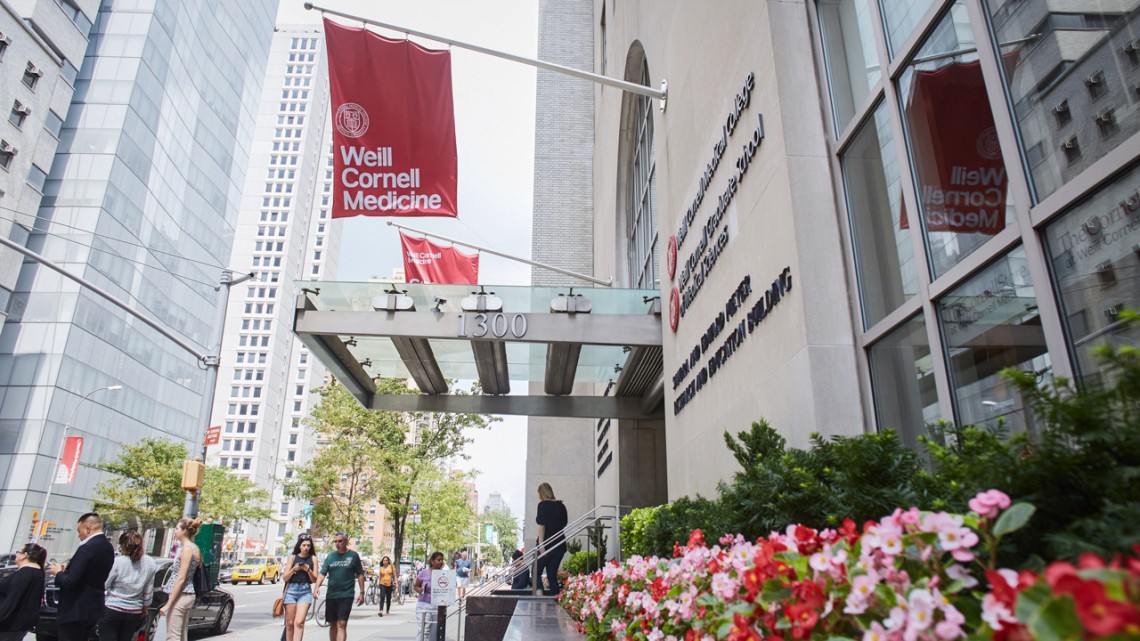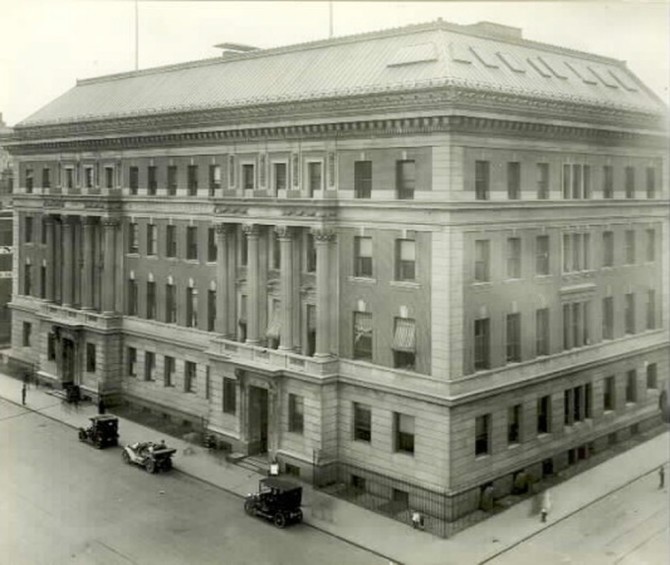
The 1300 York Avenue entrance in 2016.
Weill Cornell Medicine celebrates two landmark anniversaries
By Jane Langille
Weill Cornell Medicine is celebrating more than a century of excellence in medical education, scientific discovery and patient care, commemorating 125 years since its founding. What began on April 14, 1898, as Cornell University Medical College in four temporary classrooms on the grounds of Bellevue Hospital is today a state-of-the-art academic medical center on the Upper East Side of New York City with reach across six continents.
The institution is also celebrating the 25th anniversary of the renaming of its medical and graduate schools on April 30, 1998, for the leadership of longstanding supporters Sanford I. Weill and his wife, Joan Weill. The Weill family’s $100 million gift in 1998 ushered in a new era at Weill Cornell Medicine.
The institution has changed dramatically over the years. In that time, it has pioneered the Pap smear to detect cervical cancer, produced accomplished alumni including Dr. Anthony Fauci, M.D. ’66, former director of the National Institute of Allergy and Infectious Diseases, and former NASA astronaut Dr. Mae Jemison, M.D. ’81. And it has expanded its clinical services across the five boroughs and its education globally, while remaining anchored in the central value of social justice.
“The Weill Cornell Medicine story is one of ambition, compassion and resilience,” said Dr. Francis Lee, interim dean of Weill Cornell Medicine and interim provost for medical affairs of Cornell University. “While we can boast of our accomplishments in education, the lab and the clinic, we are equally proud of our dedication to innovation, not just technological, but in how we pursue diversity and inclusivity across our core missions to care, discover and teach.”
The institution was among the first medical colleges to admit women. As a result of the Civil Rights Movement, Weill Cornell Medicine created the Travelers Summer Research Program to increase the pipeline of physicians historically underrepresented in medicine – an initiative that has trained more than 1,200 premedical students and continues today. A recent scholarship program drastically reduces medical education debt for all students who qualify for financial aid, expanding the opportunity to become a doctor to future physicians who will reflect the diversity of the patients they will treat.
Scientific discovery underpinned Weill Cornell Medicine’s blossoming into a robust academic medical center on the Upper East Side, built in 1932 in collaboration with then-New York Hospital – today its partner NewYork-Presbyterian. Funding from the federal government from the time Weill Cornell Medicine paired up with the hospital in the 1930s through the ’60s drove the expansion of the institution’s research. That support continues today, with the National Institutes of Health awarding 1,135 grants to Weill Cornell Medicine researchers in 2021-2022 alone to fund biomedical research with the potential to transform patient care.
Today, nearly 1,900 physicians see more than 3 million patients annually at 165 sites and five hospitals throughout the greater New York area. These doctors conducted more than 950 clinical trials in 2021-22, offering patients new treatment options.
Today, more than 2,500 faculty are training the world’s future health care leaders across a range of specialties, including 1,650 currently enrolled students. A modern medical education curriculum, unveiled in fall 2014, integrates the scientific basis of disease with early exposure to clinical care, exemplifying Weill Cornell Medicine’s commitment to patients. Weill Cornell Graduate School of Medical Sciences boasts more than a dozen doctoral and graduate programs to nurture the next generation of leading scientific minds. And the Tri-Institutional M.D-Ph.D. Program has educated successful physician-scientists for 50 years.
Many of these recent accomplishments would not have been possible without Mr. Weill’s two decades of leadership as chair of the Weill Cornell Board of Fellows from 1994 to 2014 and the Weill family’s gifts to Weill Cornell Medicine that total more than $700 million.
Committed to changing medicine around the world, the Weill Cornell Medicine Center for Global Healthmobilizes and supports international partners to improve the health of people in resource-poor countries, such as Haiti, Tanzania and Brazil, through research, training and service. Weill Cornell Medicine’s investigators have for decades conducted translational research, focusing on infectious disease, such as HIV/AIDS, tuberculosis and other tropical diseases.
“Disease knows no borders, and we are committed to improving health for as many people as possible at home and internationally,” Lee said. “Our laser-focused commitment to excellence in clinical care, biomedical research and education around the world will continue to serve us well as we expand and achieve new heights in the coming years.”
This article was adapted from the original, written by Jane Langille, a freelance writer for Weill Cornell Medicine, and Weill Cornell Medicine staff.
Media Contact
Get Cornell news delivered right to your inbox.
Subscribe

